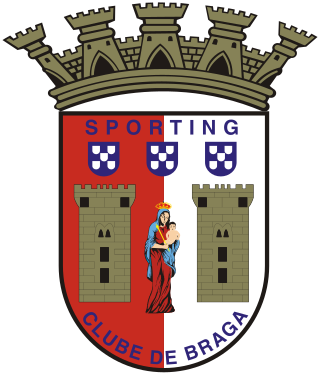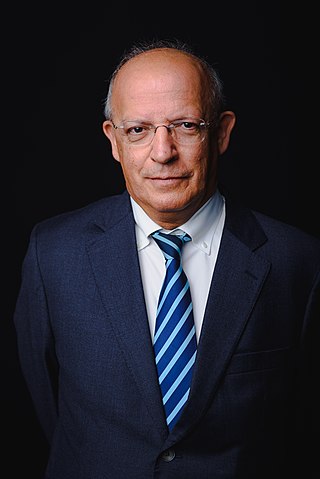
Porto or Oporto is the second largest city in Portugal, the capital of the Porto District, and one of the Iberian Peninsula's major urban areas. Oporto city proper, which is the entire municipality of Porto, is small compared to its metropolitan area, with an estimated population of just 231,800 people in a municipality with only 41.42 km2. Porto's metropolitan area has around 1.7 million people (2021) in an area of 2,395 km2 (925 sq mi), making it the second-largest urban area in Portugal. It is recognized as a global city with a Gamma + rating from the Globalization and World Cities Research Network.

Sporting Clube de Braga, commonly known as Sporting de Braga or just Braga, is a Portuguese sports club from the city of Braga. It is best known for the professional football team playing in the Primeira Liga, the top flight of Portuguese football at the Estádio Municipal de Braga.

The University of Aveiro is a public university, in addition to providing polytechnic education, located in the Portuguese city of Aveiro. Founded in 1973, it has a student population of approximately 12,500, distributed among 58 graduate, 40 Masters of Science and 25 PhD programs, distributed by departments and autonomous sections, with specialized faculties. It is a Research & Development university, with research departments developing programmes in fundamental and applied mathematics, physics, chemistry, telecommunications, robotics, bioinformatics, sea sciences, materials, design, business administration and industrial engineering.

Público is a Portuguese daily national newspaper of record published in Lisbon, Portugal.

The Federal University of Itajubá, is a federal university located in the state of Minas Gerais, Brazil. It is considered the first technological university and one of top ten engineering schools in Brazil. Extremely reputable among Brazilian engineering schools, it carries more than 100 years of tradition in teaching, with emphasis on Electrical Engineering – which is one of the best research institutes on Power Systems field in Latin America – Mechanical Engineering, Environmental Engineering, Materials Engineering, Automation and Control engineering and Computer Engineering.
The year 2007 in Portugal.

The economy of Portugal is ranked 34th in the World Economic Forum's Global Competitiveness Report for 2019. The great majority of the international trade is done within the European Union (EU), whose countries received 72.8% of the Portuguese exports and were the origin of 76.5% of the Portuguese imports in 2015. Other regional groups that are significant trade partners of Portugal are the NAFTA, the PALOP, the Maghreb and the Mercosul. The Portuguese currency is the euro (€) and the country has been a part of the Eurozone since its inception. Portugal's central bank is the Banco de Portugal, which forms part of the European System of Central Banks, and the major stock exchange is the Euronext Lisbon, which belongs to the NYSE Euronext, the first global stock exchange.

The Bridge of Cava da Velha is a Roman bridge, situated in the civil parish of Castro Laboreiro e Lamas de Mouro, in the municipality of Melgaço in northern Portuguese district of Viana do Castelo.

Ponte das Caínheiras is a masonry bridge in the civil parish of Castro Laboreiro e Lamas de Mouro, municipality of Melgaço, in the district of Viana do Castelo, on the narrow traffic area over the Rio das Caínheiras.
Events in the year 2011 in Portugal.

The Catholic University of Portugal, also referred to as Católica or UCP for short, is a concordat university headquartered in Lisbon and with four locations: Lisbon, Braga, Porto and Viseu. Besides the four centres in Portugal, UCP also has the University of Saint Joseph in Macau as its affiliate.

The Devesas Factory Warehouse is a former-warehouse used for materials in the civil parish of Cedofeita, Santo Ildefonso, Sé, Miragaia, São Nicolau e Vitória, in the municipality of Porto, in the Portuguese district of the same name.
The Instituto de Engenharia de Sistemas e Computadores - Investigação e Desenvolvimento (INESC-ID) is a non-profit, privately owned institution of public interest, in Lisbon, Portugal, dedicated to advanced research and development in the domains of electronics, energy, telecommunications and information technologies. It was awarded the status of Associate Laboratory of the Portuguese Ministry for Science and Technology in 2005.
The University of Porto is a Portuguese public research university located in Porto, and founded on 22 March 1911. It is the second largest Portuguese university by number of enrolled students, after the University of Lisbon, and has one of the most noted research outputs in Portugal.

Augusto Ernesto dos Santos Silva is a Portuguese sociologist, university professor, and politician who has been the President of the Assembly of the Republic since 2022, in the 15th Legislature. From November 2015 to March 2022, he was the Portuguese Minister of Foreign Affairs, in the XXI and XXII Constitutional Governments led by Prime Minister António Costa.
The following lists events during 2016 in Portugal.
João Abel Peças Lopes is an electrical engineer. He got is License and PhD degrees from Faculdade de Engenharia da Universade do Porto in 1981 and 1988 respectively. He develops his research activities at Instituto de Engenharia de Sistemas e Computadores, Tecnologia, e Ciência in Porto, Portugal. He is presently associate director at INESC TEC. He is also Full Professor at FEUP since 2008. Professor Peças Lopes was named a Fellow of the Institute of Electrical and Electronics Engineers (IEEE) in 2016 for his contributions to microgrids and the integration of wind generation. He is a member of the Power Systems Dynamic Performance Committee of the IEEE PES. He is member of the Board of the Smart Energy Lab, a CoLAB in Energy Services. He is Chair of the Scientific Council of EnergyIn. He is since 2012 Chair of the REN award committee. He is Vice-Presidente of the board of the Portuguese Association for Electric Vehicles. He is presently Chair of the International Steering Committee of the IEEE Power Tech. He is member of the Consulting Board of Agência de Energia do Porto . He is member of the Scientific Council of FCT. He is Member of the General Council of APREN He is Editor of the (SEGAN) Sustainable Energy Grids and Networks journal. He is Honorary member of the editorial board of the IET Energy Conversion and Economics He is Associate editor do Journal on Modern Power Systems and Clean Energy He is Associate editor of the China Electrotechnical Society Transactions on Electrical Machines and Systems. He is co-author of more than 400 publications and co-editor of the book "Electric Vehicles Integration into Modern Power Networks" from Springer. This book was one of the top 50% most downloaded eBooks from Springer. He is registered with more than 10.000 citations. He supervised more than 30 PhD Thesis in Portugal and abroad.
Luis Miguel Pinho is a Professor and Researcher in the Computer Engineering Department of the Polytechnic of Porto - School of Engineering (ISEP), in Portugal. He was a member of the Research Center in Real-Time and Embedded Computing Systems, and is Executive Director of the Porto Research, Technology & Innovation Center.

REP(MUS) (Robotic Experimentation and Prototyping using Maritime Uncrewed Systems) is an annual military exercise organized and hosted by the Portuguese Navy and NATO with the participation of forces from foreign military forces, universities and tech companies. The exercise has the objective of testing different types of unmanned aerial vehicles, unmanned surface vehicles and unmanned ground vehicles. Today it is the largest UAV testing exercise, with the participation of several NATO countries.
João P. S. Catalão is a Portuguese electrical engineer and academic. He is currently a professor in the Faculty of Engineering at the University of Porto. He is an IEEE fellow.















